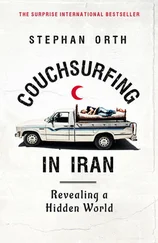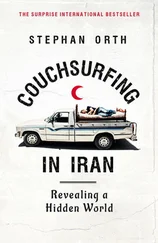“My philosophy when I’m traveling is to say ‘yes’ as often as possible.”
He pours the coffee into two Ikea mugs.
“Just be very careful with that in Russia. It could get you into trouble.”
To prove his point, the first sip of “kick in the morning” blows out my brains. Genrich, on the other hand, seems to be immune to chili peppers and in no time at all has downed his mug. He then puts on his jacket. “I have to go now, an important appointment.” He gives me the spare key to the apartment. “Make yourself at home!” The door closes noisily and I’m on my own.

LISTENING
AS SOON ASI regain the feeling in my tongue and my pulse is back in the two-digit range, I leave the apartment and head for the city. Sightseeing time. Moscow is the biggest construction site in Europe; new parks are springing up on every corner, and a huge pile of rubles is flowing into a high-rise district called “Moscow City.” There are plans for pedestrian zones as well as sidewalks, which have long been neglected in some places, as Muscovites are not known for their love of walking. (This, of course, evokes the old chicken-and-egg conundrum: is it possible that Muscovites are not keen walkers because there are no attractive paths?) The city mayor proclaimed a “Green Summer”; green is also the color of the plastic tarps that mark the construction sites of the city beautification program, and there are plenty of them.
I go by metro as far as Kropotkinskaya, then by foot via Balchug Island to the south bank of the Moskva River. Almost exactly twenty-five years ago, the German band Scorpions sang about following the Moskva to Gorky Park in their hit song “Wind of Change.” By “change” they meant a shift in orientation, an end of conflicts, Russia and the West growing together. Twenty-five years is a long time, and the dreams of those days seem a long way away now. I decide to conduct an experiment: What do you hear today when walking along the Moskva toward the park?
First of all, traffic noises, a cacophony of cars, and plenty of honking of horns.
The unoiled chain of a racing bike—there’s a bike lane on the neatly concreted promenade hugging the river.
The click-clacking of high heels, the scuffle of men’s loafers, and the regular beat of rubber-soled running shoes.
The rustling of wind in the trees lining the promenade and the running motor of a cab whose driver is nowhere to be seen.
The gushing water cascading beneath the 320-foot memorial to Czar Peter the Great, a drab colossus from the ’90s—a time when a number of things went terribly wrong in Russia. The statue depicts a huge-masted ship, with the monumental monarch standing astride it holding a scroll.
This pricey work of art, made out of bronze and stainless steel, cost more than US$15 million and has the dubious honor of often appearing on lists of the ugliest memorials in the world. If poor Peter, who was a great aesthete and the most Europe-friendly of all czars, only knew. According to surveys the majority of Muscovites would like to melt it down, and sooner rather than later. Or else transport it to the dacha of whoever is responsible for its being here. Or send it in exile to Saint Petersburg (a proposal that was sharply dismissed in Saint Petersburg). The cascades beneath the ship were intended to give the impression of a ship moving through water, a point no one understood as the keel of the ship is way above the water.
I close my eyes and continue listening. The noise of an excavator, the chugging of an excursion boat—the Moskva84— the voices of passersby. One girl sings the chorus of the Titanic song, “My Heart Will Go On,” as if wishing for the sinking of Peter’s bronze hulk; her friend laughs. Up on the Crimean Bridge, the blaring of police sirens; below, the rasping of a road sweeper’s brush on the asphalt.
A few yards further, a ventilation system in front of the park management building rattles like a faulty hairdryer. Inside, they have a lot to do at the moment, as a large proportion of Gorky Park is sealed off due to renovation work. Screeching excavators spread out sand for a beach volleyball court; two lawn mowers whine near the Golitsynsky Pond. A few beds further along, men with hoes and rakes hack away at the undergrowth to make space for new plants. One of the workers drags a wooden stick along a metal railing, each post making a different sound.
Sparrows tweet, pigeons coo, dogs bark, and kids wail. And there’s also music. Dutch house beats droning from Pelman Cafe, American saxophone jazz from Chaynaya Vysota, and Noel Gallagher Britpop from the headphones of a passerby with a burlap tote bag proclaiming Open to the Future . Such a huge range of impressions picked up simply by listening. But there are too many different tones on the banks of the Moskva to discern which winds of change are actually blowing here.
“DID YOU SLEEPwell?” asks Genrich the next morning in perfect German. Porridge is bubbling away in a pot while my host, with the dexterity of a professional chef, chops banana slices, all exactly the same thickness, into it.
“Is it true that all Germans swim naked?” he wants to know.
“Is it true that all Russians drink vodka for breakfast?” I retort.
Genrich now switches to English; things are getting serious.
“According to statistics, Russians are drinking less every year. In particular, vodka. Twenty years ago alcohol consumption was a real problem. But things have improved.” His own history seems to bear this out. “In the olden days I liked drinking; I liked the smell and the taste. I loved Stroh 80 rum. But now my body has something against alcohol. The last time I went boozing with buddies I was sick for two days, real poisoning; I almost died. Since then I only use alcohol for cooking.”
His most memorable experience in the military—one year in the infantry somewhere in the north, far away from Moscow—also had to do with alcohol. At a New Year’s Eve party he went jogging to a store in his pajamas, in way-below-freezing temperatures, to replenish supplies with five bottles of vodka. A heroic mission, half an hour there and half an hour back at night in the freezing cold. His brave deed didn’t get the praise it deserved: “The next day everyone was just going, ‘Shit, which idiot went out to get even more vodka?’”
On top of the mound of porridge, brand name “Gerkules” (the Russians are not too keen on the letter h ), Genrich piles banana slices, meringues, chocolate cookies, chocolate flakes, butter, a clump of frozen yogurt, and some lime. “Sadly I don’t have any mint, what a pity,” he apologizes as he serves up the best oatmeal breakfast in the history of civilization.
In the following days Genrich proves to be the ideal host, a witty conversationalist who has the gift of being able to switch from trivial to highbrow topics at a moment’s notice. One minute he’s lecturing about the linguistic construction of the progressive and regressive assimilation of schwa sounds; two minutes later he’s moved on to the musical works of the German thrash metal band Sodom. Sprinkled throughout is the odd reprimand or instruction reminiscent of the tone of his online profile: “As much as I appreciate your washing the dishes, permit me to say that the proper place for drying them is the draining rack above the sink and not the sideboard.” He loves complicated sentence constructions and old-fashioned politeness. His polished English sometimes leaves the impression that we are in the middle a Charles Dickens novel and not in a two-room apartment in Moscow. Eventually he explains why his profile is so complicated. He simply had too many inquiries and he wanted to make sure that the people who contacted him were doing so for the “right” reasons and not just to save money.
Читать дальше
![Stephan Orth Behind Putin's Curtain: Friendships and Misadventures Inside Russia [aka Couchsurfing in Russia] обложка книги](/books/415210/stephan-orth-behind-putin-s-curtain-friendships-a-cover.webp)












